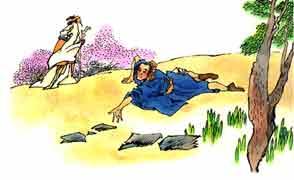| Chinese Idiom Learning (4) | |
|---|---|
| Dec 5, 2007 02:25 | |
 | No.1 邯郸学步 (Han 2 Dan 1 Xue 2 Bu 4). It means: "Learn the Handan walk---in trying to acquire a new trick, lose the ability one already has. History: About two thousand years ago, there was a guy from the Yan Country. He needn't worry about his meals because his family was rich and he was not ugly. However, he was always lack of confidence toward himself. One day, he met a couple of people on the street talking about the Handan people. They said that Handan people walked very elegantly. While hearing what they said, this guy was trying to imagine how the Handan people walk but failed. Thus, he decided to go to Handan and learn the Handan people walk. After arriving Handan, he found that Handan people really walked elegantly no matter they were children, adults or oldmen. Immediately, he started to learn to walk as they did (No matter they were children, adults, oldmen, female or male). Finally, he learned nothing and forgot how to walk. Thus, he just crawled back home.  |
| Dec 5, 2007 02:52 | |
 | No.2 朝三暮四 (Zhao 1 San 1 Mu 4 Si 4) It means:”Three at dawn and four at dusk------blow hot and cold or chop and change." History: In the ancient state of Song, there was an man who was very fond of raising monkeys. He understood his monkeys very well and his monkeys seem to understand what he was talking. He frequently reduced his family's food supply to feed his monkeys. Soon, he found that his families did not have enough food to eat so that he had no choice but to reduce his monkeys' food. He were afraid that his monkeys would disagree with him. So he talked with his monkeys:" If I gave you three taros at dawn and four at dusk, would it be ok?" His monkeys did not accept his proposal and were very angry. Then he said to his monkeys:” If I gave four taros in the morning and three in the evening, would it be enough?" Now, his monkeys were very happy and thought that they got one more taro. Actually, they just had seven taros a day and there was no change. We usually use this idiom to depict a person who is of a variable mood---making many ideas but changing his mind very quickly.  |
| Dec 5, 2007 11:01 | |
 | In Wenlin it says 朝三暮四 zhaosanmusi "hoodwink the gullible" which is what the man did to the monkeys. Wenlin lists "being fickle" as the second meaning. ...but in any event, I understand. 邯郸学步 is not so clear to me. ...he tried so hard to imitate the walk that he lost what he had??? |
| Dec 5, 2007 19:42 | |
 | Yes, Griz. He tried hard to imitate the walk and totally forgot how to walk because he imtated several ways of walking, children, adults and oldmen. |
Post a Reply to: Chinese Idiom Learning (4)






 Copyright © 1998-2026 All rights reserved.
Copyright © 1998-2026 All rights reserved.